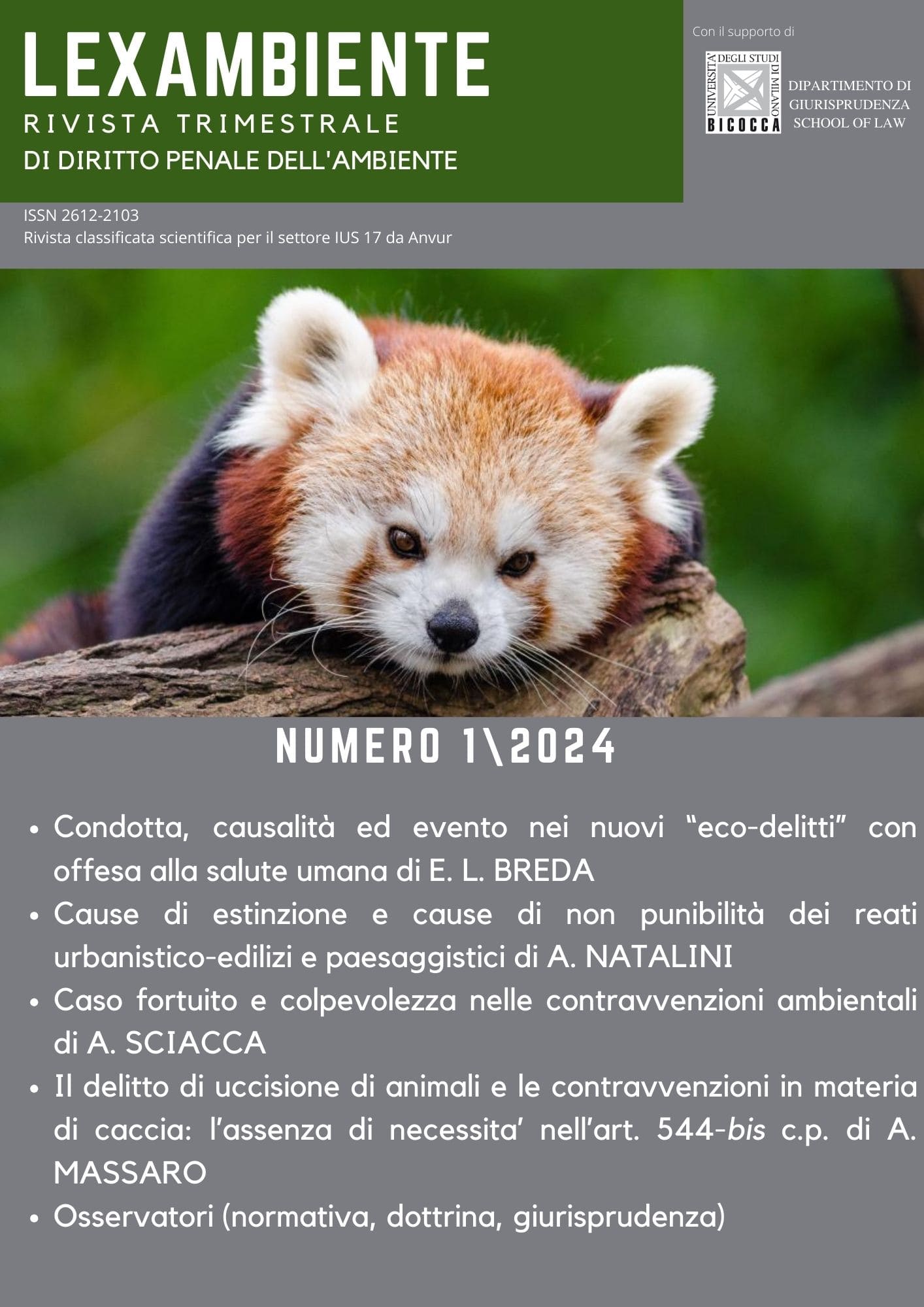Hybrid nature of confiscation and remedial purpose of environmental confiscation: there is no breach of the criterion of reasonableness and equality in the failure to provide for the possibility of excluding confiscation in the event of reclamation or restoration of the places following an unlawful infringement.
di Giuseppe NUARA
Pubblicato nel n. 3\2020
Lo scritto è stato sottoposto, in forma anonima a blind peer review
Abstract. Partendo dalla sentenza n. 15965 del 2020, il contributo analizza la natura dell'istituto della confisca e, nello specifico, la finalità riparatoria della confisca ambientale. Nella summenzionata decisione, infatti, gli Ermellini si soffermano sulla natura della bonifica ex art. 452 undecies c.p, sottolineando come la stessa misura sia condizionata al compimento di uno dei delitti ambientali dolosi introdotti dalla medesima legge 22 maggio 2015 n. 68 risulti condizionata dalla natura degli effetti disastrosi e talvolta irreversibili delle condotte delittuose. La Suprema Corte ritiene dunque manifestamente infondata l'eccezione di illegittimità costituzionale della norma nella parte in cui non prevede che l'obbligo di confisca possa venire meno anche in ipotesi di ripristino dello stato dei luoghi seguenti alla violazione prevista dall'art. 256 del d.l. n. 152/2006. E dunque, secondo la Corte, l'omessa estensione dell'ipotesi di disapplicazione della confisca anche alle fattispecie contravvenzionali non viola il principio di uguaglianza formale e sostanziale tutelato dall'art. 3 della Costituzione. La differente normativa, infatti, è giustificata dalla diversa natura delle confische, quella ex art. 452 undecies ha una funzione risarcitoria-ripristinatoria, mentre la confisca ex art. 260 ter d.lgs 15 del 2006 ha una funzione punitivo-sanzionatoria.
Abstract. Starting from the judgment no. 15965 of 2020, the contribution analyzes the nature of the institution of confiscation and, specifically, the reparatory purpose of environmental confiscation. In the above-mentioned decision, the Court refer to the nature of the remediation ex art. 452 undeciesc.p, emphasizing that the same measure is conditioned by the fullness of one of the malicious environmental crimes introduced by the same law May 22, 2015 n. 68 is conditioned by the nature of the disastrous and sometimes irreversible effects of criminal conduct. The Supreme Court therefore considers manifestly unfounded the exception of constitutional illegitimacy of the rule in the part in which it does not provide that the obligation to confiscate may fail even in the power to restore the state of the places following the breach provided for in art. 256 of d.l. n. 152/2006. And therefore, according to the Court, the omission of the extension of the possibility of disapplication of confiscation to contravention cases doesn't violate the principle of formal and substantive equality protected by art. 3 of the Constitution. The different legislation, in fact, is justified by the different nature of the confiscations, the one pursuant to art. 452 undecies has a function of compensation and restoration, while the confiscation pursuant to art. 260 terd.lgs 15 of 2006 has a punitive-sanctioning.
Parole chiave: Sanità pubblica, Confisca, Obblighi di bonifica o di ripristino dello stato dei luoghi, Questione di illegittimità costituzionale dell’art. 452 undecies ult.co c.p., Esclusione (Cod. pen., art.452 undecies; d.leg.3 aprile 2006, n. 152, norme in materia ambientale, art.256)
Key words: Public health, Confiscation, Obligations of reclamation or restoration of the state of the places, Question of constitutional illegitimacy of art. 452 undecies ult.co c.p., Exclusion (Cod.
pen., art.452 undecies ;d.leg. 3 aprile 2006, n. 152, norme in materia ambientale, art. 256)





